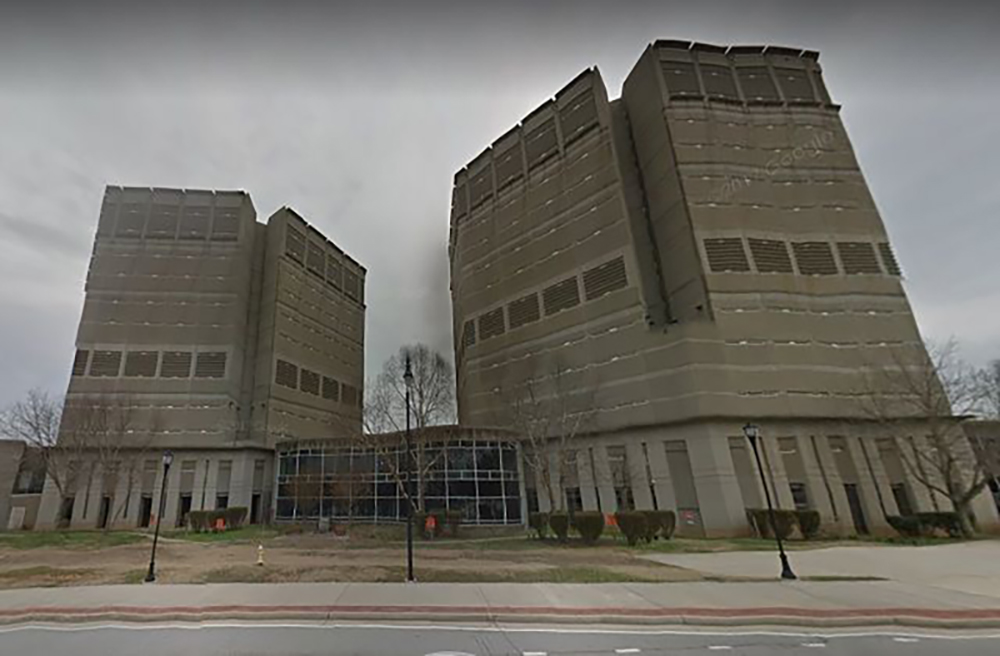
(Photo: Google Street View)
In early April, Malaya Abdullah-Tucker shared screenshots of a video conference with inmates at DeKalb County Jail in Georgia on her Instagram account. The conferences are known as “remote visits,” through which inmates and their loved ones can stay in touch. The screenshots feature three men—one of whom is Abdullah-Tucker’s son—holding up lunch trays with handwritten messages like, “DeKalb Jail is mistreating us,” “We sleep and breathe mold,” and “Please help, we dying.”
Abdullah-Tucker urged other Instagram users to share the images to publicize the conditions at DeKalb County Jail—and it worked. As of this writing, the post has 8,909 likes and 3,436 comments. According to Abdullah-Tucker, DeKalb County Jail even took notice. Five days after posting the screenshots, she received word that guards at the jail had attacked her son and the two other men in the pictures. Facility administrators deny her allegations. (Multiple requests for comment from Pacific Standard to the DeKalb County Sheriff’s Office ultimately went unanswered.)
“The retaliation reported from several inmates was that the guards had swarmed my son and the other two gentlemen’s cells, put their heads in the toilet, beat the crap out of them, and put them in solitary confinement,” she says. “Since then, I have not had any communication with my son.”
Undeterred, Abdullah-Tucker has continued railing against the conditions at DeKalb County Jail and its staff’s alleged violent response to inmates’ pleas for help. Former inmates and activists have come to her aid, substantiating her claims and taking the fight from the Internet to real life.
In the past, even the administrators of DeKalb County Jail have admitted that conditions there are not ideal. Just west of Atlanta, in Decatur, Georgia, the jail is the largest pre-trial detention facility in the state and, on average, detains 33,000 men and women each year. It is managed by the DeKalb County Sheriff’s Office, which is led by Sheriff Jeffrey Mann. In 2018, the Sheriff’s Office received $1.5 million to address issues plaguing the jail—in particular, the problem of mold. Mann requested another $9.5 million from the county government for further repairs in 2019, but received less than a tenth of that amount. Regardless, he dismissed the most recent complaints about conditions in an interview with The Atlanta Journal-Constitution, saying protesters were “Just out there creating a disruption rather than being productive and rather than calling, emailing, or going on the website: It’s not fruitful.”
Inmates, on the other hand, remain concerned. The screenshots originally posted by Abdullah-Tucker reference widespread problems with mold, both in the facility and in inmates’ food. Although the Sheriff’s Office has long claimed that the mold poses no health risks, Abdullah-Tucker describes inmates suffering from trouble breathing, skin irritation, and other adverse effects, which she has learned of through conversations with her son and others currently or formerly detained there.
“There’s mold infestation throughout the entire facility,” she says. “They cut off the air at night because, even though it’s miserable with the heat and very uncomfortable, [inmates say] it’s even worse if the air is on because the mold is in the vents.”
Abdullah-Tucker’s post not only revealed the ongoing problems with mold at DeKalb County Jail, but other issues as well. After sharing the screenshots, she began receiving messages from Instagram users who had been held or had family held at the facility. They accused jail administrators of denying inmates life-saving medication, neglecting those with serious medical conditions, and violently retaliating against anyone who speaks up.
Abdullah-Tucker also received messages from those who wanted to help. In particular, she was contacted by the Incarcerated Workers Organizing Committee, a labor union for prisoners that has been involved in many national and local struggles for inmates’ rights. Although the Atlanta branch of IWOC was relatively new, it was interested in helping however possible. Together, Abdullah-Tucker and Atlanta IWOC interviewed inmates about the conditions of their detention via remote visits, published their findings on social media, and organized demonstrations to pressure administrators to address their concerns.
“We demand an audit into Dekalb County Jail’s spending,” says Lee Nguyen, an organizer with Atlanta IWOC. “Sheriff Jeffrey Mann had supposedly received millions toward repairs, but they remain to be seen.”
Atlanta IWOC held its first protest outside of DeKalb County Jail on the night of April 12th. The “noise demo” attracted about 50 participants, who used firecrackers, drums, pots, and pans to alert inmates of their presence and to express their solidarity. Protesters managed to enter the jail’s lobby with bread that they intended to offer inmates before being repelled by guards.
Four activists were arrested, but have kept at it, fundraising for their own bail and legal defense, while also organizing other events, like rallies, marches, strategy meetings, and trainings on legal rights and filming the police. Another demonstration on May 15th also met with four arrests.
“I commend them for being so brave,” Abdullah-Tucker says of the protesters.
Like Atlanta IWOC, Abdullah-Tucker has no intention of letting up. She maintains regular contact with the organizers and continues posting about the situation at DeKalb County Jail—although the circumstances have become even more torturous. After allegedly brutalizing her son and placing him in solitary confinement, administrators revoked Abdullah-Tucker’s visitation rights, which took nearly a month to restore. Yet even now she is unable to contact her son, who remains in solitary.
With no other reason provided by administrators, Abdullah-Tucker believes her son’s confinement is due to her Instagram posts. But rather than feeling guilt, she feels defiant—inspired in no small part by her son himself. She recalls his unwavering conviction in the face of the dire consequences he predicted he would face for scrawling a message across a lunch tray.
“If I die behind this, it’s fine, because I’d rather that than for everyone around me to get treated this way,” she remembers him saying during their last conversation. “This is not how human beings are supposed to be treated.”



